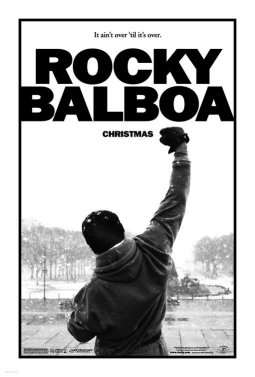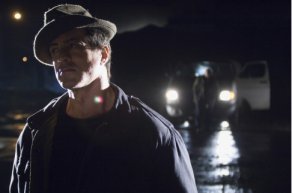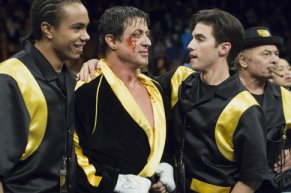|
Rocky
Balboa
As a metatextual
statement on Sylvester Stallone's career, Rocky Balboa
can be respected. Both Stallone and his alter ego want to
prove they still have whatever it was that made them great.
That task has been made harder by the memories of Rocky
V. Okay, in Stallone's case, by a lot more movies than
that one.
At heart, too,
they both seem like decent enough people. We want to root
for them both, though the excesses of Stallone's life definitely
tinge Rocky Balboa's. The bad plastic surgery alone makes
Rocky look like a wax dummy of himself, which almost creates
a post-modern feedback loop every time the camera comes
close to reveal that maybe, just maybe, this thing breathes.
Then again,
Rocky wouldn't appreciate the use of terms like "metatextual"
and "post-modern," and so we could write this one off as
simply a well-intended failure. Rocky might be okay with
that.
But Stallone,
writing and directing, is clearly reaching for more. Like
Rocky standing table-side at his restaurant, regaling customers
with stories of his old fights, Stallone can't quite understand
why he isn't more loved instead of tolerated. Once upon
a time, he was a hot director.
Talented, yes,
but Stallone also had a weakness for pandering to audiences.
Rocky IV and Rambo: First Blood Part II were
films that absolutely summed up the excesses of eighties
filmmaking, and an older, wiser Stallone keeps fighting
against his crowd-pleasing tendencies. Especially since
the crowds he once pleased are older and wiser, too. Or
at least older.
So we get a
meditation on the champion in his autumn years. He still
hangs out with Paulie (Burt Young), no more patient or couth
than before. Somehow, Talia Shire ducked reprising Adrian,
or perhaps Stallone decided it would make for greater drama
if the love of Rocky's life died before him. At any rate,
her ghost doesn't just haunt the film; it too often weighs
it down. When Paulie screams at Rocky that he can't obsessively
relive all the high points of Rocky and Adrian's courtship
anymore, the audience has to agree.
One character
trying to shed the past is Rocky Jr. (Milo Ventimiglia),
shallowly written as feeling overshadowed by his father
and improbably reformed by a Rocky soliloquy that should
have subtitles flashing "Sylvester Stallone's Life Philosophy."
If not that, it definitely shouldn't have been repeated
in voice-over at a climactic moment.
At the same
time, Rocky tries to play father figure to Steps (James
Francis Kelly III), the son of "Little Marie" (Geraldine
Hughes), the foul-mouthed little girl from the first film.
When the two sons collide, the only friction comes from
their shoulders accidentally rubbing while wearing "Team
Rocky" jackets. Though Stallone plants the seeds of a quieter
drama, he also has to prove that he's still got it as an
athlete.
To that end,
he sets up an opponent that does remind us that the glory
days of heavyweight boxing seem far away. Real-life light
heavyweight champion Antonio Tarver fills in the outline
of Mason "The Line" Dixon, a character with traces of regret
that never get to really flourish. His backstory seems borrowed
from Mike Tyson, with a happier ending and a jarring moment
when Tyson actually cameos in the film.
The conflict,
however, seems forced. For that matter, every plot turn
here feels like it's just going by the numbers. While the
videogame match-up between Dixon and Balboa makes a clever
moment, it's hard to swallow as the first domino to lead
to a real fight.
Then again,
part of the problem is that Stallone successfully popularized
this formula. When Rocky trains, you might faintly hear
Trey Parker and Matt Stone singing "Montage," but remember
that they were mocking Stallone in the first place. The
irony is as thick as Rocky's hands.
Yet the movie
still has crowd-pleasing power. Stallone has kept pace with
modern film-making techniques, experimenting with color
and angles in a way he couldn't have twenty years ago. Even
though it's manipulative, the third act still has some whimsy
and a sense of the sportsmanship of boxing that the sport
itself seems to have lost. And then there's closing credits
that could easily have been mawkish but instead feel exuberant.
Rocky Balboa
isn't brilliant, but it is earnest. It just doesn't have
the confidence or the daring to do much more than walk down
memory lane and say good-bye to a character that really
has become an American icon. For some people, that will
be enough.
Rating:

|








